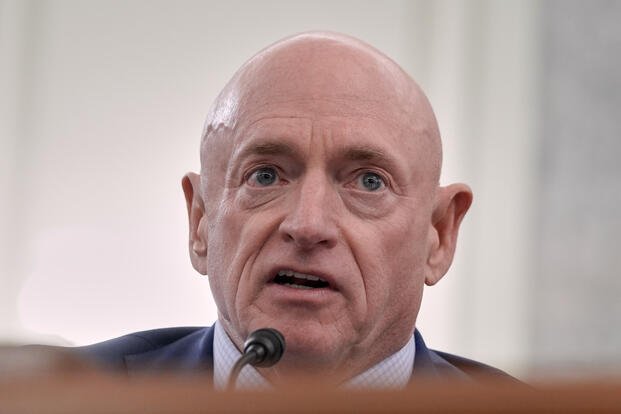Military Veterans Call Out Trump, Hegseth and Pentagon in New Video

Ten military veterans of different service and rank have made their own video in support of U.S. Sen. Mark Kelly and his congressional colleagues who are caught in a back-and-forth with the Pentagon after urging active-duty members to ignore illegal orders.
The new joint video, released on platforms including YouTube, features veterans and members of several national veterans' groups including Save America Movement, Valor Media, Common Defense, Veterans for Responsible Leadership, and The Chamberlain Network. It shows veterans speaking out in support of Kelly and others amid threats from the Trump administration to court-martial the Arizona senator. They describe the move as unprecedented and a politically motivated use of Uniform Code of Military Justice (UCMJ) authority.
On Monday, the Pentagon said in a social media post that it was launching “a thorough review” of allegations of misconduct against Kelly, a retired Navy captain and astronaut from Arizona, for “serious allegations of misconduct.” Kelly and a handful of Democratic colleagues in the House and Senate released a video last week urging U.S. troops to refuse what they described as illegal orders.
“So ‘Captain’ Kelly, not only did your sedition video intentionally undercut good order and discipline but you can’t even display your uniform correctly,” Defense Secretary Pete Hegseth wrote on X, adding, “When or if you are recalled to active duty, it’ll start with a uniform inspection.”
The review was widened on Tuesday when the FBI was reported to now be interviewing Kelly and five other congressional Democrats: Sen. Elissa Slotkin (MI) and House Reps. Jason Crow of Colorado, Maggie Goodlander of New Hampshire, and Chris Deluzio and Chrissy Houlahan, both of Pennsylvania.
Preserving the Oath
The veterans’ video features 10 service members, some retired, across branches including the Army, Navy and Marine Corps. As one veteran says, “I want to talk about Mark Kelly.”
Members in the short video said Kelly is upholding his oath to the country and Constitution from “a targeted attack” emanating out of the executive branch, which as one veteran said impacts the duty of military members who could be ordered to do things which undermine the very citizens they are supposed to protect.
“We all took an oath, not to serve a king or a tyrant but to defend the Constitution. Don’t give up the ship,” the video concludes.
'Shocking' State of Affairs
Kenneth Harbaugh, a U.S. Navy veteran who served from 1996 to 2005 and was featured in the video, told Military.com[1] on Tuesday that the video is “incredibly patriotic and brave.”
His involvement in it was due to the current state of the nation.
“We've never been at this kind of crossroads in our country before, with a commander-in-chief who has a pattern of trying to get the military to do illegal or unconstitutional things—from his pressuring the military to seize voting machines back in 2020, to the suggestion that the military should shoot protesters in the legs.
“And the problem is that in the last go ‘round, we had brave officers standing between this president and unconstitutional orders like that.”
He mentioned how high-ranking military officials in President Donald Trump’s first term, like retired Army general ex-Joint Chiefs of Staff Chairman Mark Milley, more or less kept a check on the broader military apparatus.
“We called it, none of this should be surprising,” said Harbaugh, a former Navy pilot. “I think it is surprising to many Americans just because it's so shocking.
“But those of us who paid attention during Trump's first term at how far he tried to push the military, and the fact that the only reason he didn't get away from some of his more outrageous ideas and intentions was the Milley’s and the [former Defense Secretary Mark) Esper’s who stood in his way—we realized that the four years in between terms were used to plan how to avoid that accountability should he win again.”
Whether someone like Milley or Esper or James Mattis currently exists in the present administration is unknown, Harbaugh said, while adding that civilian leadership and counsel to Trump is lacking. Things have escalated throughout Trump’s second term, notably with the highly publicized gathering of admirals and generals on Sept. 30 at Quantico.
“It is telling that the very first act of the secretary of defense was to let go of any JAG who might stand in the way of illegal or unconstitutional orders,” he said. “You only do that if you're planning to break the law.”
Hegseth Branded as 'Shameful'
Asked about Pentagon leadership, Harbaugh said Hegseth has brought “shame” upon the broader military institution and claimed the secretary is using his pulpit and his department as a political tool to hound the political opposition.
“I think we should have known—some of us did know—that this was coming given the fact that [Hegseth] could not manage a small nonprofit, given the fact that his personal character failings were on display for everyone to see, sometimes on camera,” Harbaugh said.
“The fact that he should be given control over the most powerful, largest instrument of American power—the largest part of the American government—was a slap in the face to those who wear the uniform and risked their lives,” he added.
© Copyright 2025 Military.com. All rights reserved. This article may not be republished, rebroadcast, rewritten or otherwise distributed without written permission. To reprint or license this article or any content from Military.com, please submit your request here[2].
The Heart of the Boat: Inside the Auxiliary Division of the USS Wyoming
Pentagon Launches Extraordinary Review of Sen. Mark Kelly

A public showdown between the Pentagon and U.S. Senator Mark Kelly (D-AZ) has escalated into an official review that could place the retired Navy officer back under military authority altogether.
The Department of Defense is reviewing allegations of misconduct against Kelly, a retired Navy captain and astronaut, under military law after a video he appeared in urged U.S. troops to refuse what he described as illegal orders. The FBI is slated to interview Kelly and five other congressional Democrats in relation to a video they took part in, released encouraging U.S. military members to refuse to follow illegal orders, according to NBC News.
The review could lead to his recall to active duty for court-martial or other action. Past cases show resistance to recalling retired officers for court-martial in politically sensitive situations, as such actions risk blurring civil-military boundaries and setting lasting institutional precedent.
Kelly is joined by a small number of other Democratic lawmakers who have expressed similar concerns about military orders and legalities, including Sen. Elissa Slotkin (MI) and House Reps. Jason Crow of Colorado, Maggie Goodlander of New Hampshire, and Chris Deluzio and Chrissy Houlahan, both of Pennsylvania.
President Donald Trump[1] last week accused Kelly and his outspoken Democratic cohorts of “seditious behavior,” calling them “traitors. “In the old days, if you said a thing like that, that was punishable by death," Trump added.
IG: No Congressional Request
The DoD Office of Inspector General confirmed to Military.com that it has not received any formal request from Congress to review or investigate Sen. Mark Kelly’s conduct in connection with the Pentagon’s ongoing review.
“The DoD OIG has not received any request from Congress related to Senator Kelly,” spokesperson Mollie F. Halpern told Military.com.
In a follow-up response, Halpern clarified that while no congressional request has been made, her office does not confirm nor deny the existence or status of any internal work, underscoring the sensitive and highly restricted nature of Inspector General operations during potential legal or administrative proceedings.
Pentagon Signals Possible Recall
Allegations of misconduct against Kelly have triggered a rare and formal Pentagon review under military law. The DoD said in posts on social media that it has received “serious allegations of misconduct” against Kelly and has opened a review under the Uniform Code of Military Justice (UCMJ). That’s according to a Department of Defense statement shared on social media.
The Pentagon warned that retired service members remain subject to the UCMJ and cited federal law allowing recall of retirees under certain conditions. Military retirees can remain subject to military law[2] even after leaving active service, meaning certain actions may still fall under the reach of the Uniform Code of Military Justice.
The Pentagon added that all service members must obey lawful orders and that “a servicemember’s personal philosophy does not justify or excuse the disobedience of an otherwise lawful order.”
Taking the Fight Online
Defense Secretary Pete Hegseth criticized Kelly after the video surfaced.
“So ‘Captain’ Kelly, not only did your sedition video intentionally undercut good order and discipline but you can’t even display your uniform correctly,” Hegseth wrote on X, adding, “When or if you are recalled to active duty, it’ll start with a uniform inspection.”
Hegseth said Kelly was the only person in the video who remains subject to military law, and accused him of bringing discredit upon the Armed Forces.
Kelly responded in a series of posts, leaning on his decades of military and government service while rejecting any claim that he violated orders or threatened good order and discipline.
He framed the Pentagon’s actions not as a legal matter but as political intimidation, pointing to his oath and warning about the danger of using military power to silence dissent.
“When I was 22 years old, I commissioned as an Ensign in the United States Navy and swore an oath to the Constitution,” Kelly wrote on social media, referencing his time in uniform and later service as a Navy test pilot and NASA astronaut.
“Trump and his Administration are targeting me because I said something they didn’t like—but I won’t be intimidated into silence. I’ve overcome challenges a lot tougher than Donald Trump or Pete Hegseth," he said.
Kelly also warned that rhetoric referencing execution, hanging and violent punishment carries real-world consequences, saying words from elected leaders could “get someone hurt.” Kelly's wife, former U.S. Rep. Gabby Giffords, suffered a severe brain injury after being shot in the head in an assassination attempt during an event in her home state of Arizona in 2012.
Kelly described such language as reckless and un-American, and reiterated that his loyalty remains to the Constitution rather any single leader or administration.
Senior military officials have previously resisted the idea of recalling retired officers[3] for court-martial in politically sensitive cases, warning that such actions risk blurring civil-military boundaries and setting a dangerous institutional precedent.
© Copyright 2025 Military.com. All rights reserved. This article may not be republished, rebroadcast, rewritten or otherwise distributed without written permission. To reprint or license this article or any content from Military.com, please submit your request here[4].